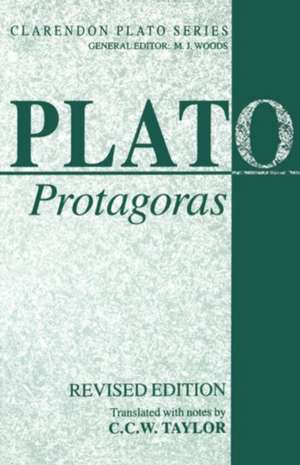Protagoras: Clarendon Plato Series
Autor Plato Traducere de C. C. W. Tayloren Limba Engleză Paperback – 5 dec 1991
| Toate formatele și edițiile | Preț | Express |
|---|---|---|
| Paperback (21) | 40.82 lei 22-36 zile | |
| CreateSpace Independent Publishing Platform – | 40.82 lei 22-36 zile | |
| Oxford University Press – 25 iun 2009 | 40.94 lei 10-16 zile | +12.64 lei 6-12 zile |
| – | 42.57 lei 22-36 zile | |
| CREATESPACE – | 44.54 lei 22-36 zile | |
| – | 45.36 lei 22-36 zile | |
| CreateSpace Independent Publishing Platform – | 45.36 lei 22-36 zile | |
| CREATESPACE – | 45.89 lei 22-36 zile | |
| CREATESPACE – | 56.06 lei 22-36 zile | |
| CreateSpace Independent Publishing Platform – | 67.19 lei 22-36 zile | |
| CREATESPACE – | 83.38 lei 22-36 zile | |
| Echo Library – 30 sep 2006 | 54.20 lei 38-44 zile | |
| Binker North – 27 aug 2023 | 75.96 lei 43-57 zile | |
| BLURB INC – 22 feb 2019 | 80.06 lei 17-23 zile | |
| Blurb – 21 aug 2022 | 81.65 lei 43-57 zile | |
| Book Jungle – 17 apr 2008 | 82.97 lei 43-57 zile | |
| Akasha Classics – 11 noi 2009 | 83.20 lei 43-57 zile | |
| TREDITION CLASSICS – 31 oct 2011 | 108.72 lei 43-57 zile | |
| Blurb – 11 feb 2019 | 113.46 lei 38-44 zile | |
| ALPHA EDITION – 10 dec 2024 | 118.48 lei 38-44 zile | |
| Bloomsbury Publishing – 30 aug 2001 | 164.50 lei 43-57 zile | |
| Clarendon Press – 5 dec 1991 | 310.38 lei 31-37 zile | |
| Hardback (1) | 186.72 lei 43-57 zile | |
| Akasha Classics – 11 noi 2009 | 186.72 lei 43-57 zile |
Preț: 310.38 lei
Preț vechi: 381.32 lei
-19% Nou
Puncte Express: 466
Preț estimativ în valută:
59.41€ • 64.55$ • 49.94£
59.41€ • 64.55$ • 49.94£
Carte tipărită la comandă
Livrare economică 09-15 aprilie
Preluare comenzi: 021 569.72.76
Specificații
ISBN-13: 9780198239345
ISBN-10: 0198239343
Pagini: 266
Dimensiuni: 135 x 202 x 16 mm
Greutate: 0.29 kg
Ediția:Revizuită
Editura: Clarendon Press
Colecția Clarendon Press
Seria Clarendon Plato Series
Locul publicării:Oxford, United Kingdom
ISBN-10: 0198239343
Pagini: 266
Dimensiuni: 135 x 202 x 16 mm
Greutate: 0.29 kg
Ediția:Revizuită
Editura: Clarendon Press
Colecția Clarendon Press
Seria Clarendon Plato Series
Locul publicării:Oxford, United Kingdom
Recenzii
`lucid, penetrating and philosophically interesting'M.C. Stokes, University of Durham
`excellent'W. Charlton, University of Edinburgh
`excellent'W. Charlton, University of Edinburgh
Notă biografică
Plato was an ancient Greek philosopher born in Athens during the Classical period in Ancient Greece. In Athens, Plato founded the Academy, a philosophical school where he taught the philosophical doctrines that would later become known as Platonism. Plato (or Platon) was a pen name derived, apparently, from the nickname given to him by his wrestling coach - allegedly a reference to his physical broadness. According to Alexander of Miletus quoted by Diogenes of Sinope his actual name was Aristocles, son of Ariston, of the deme Collytus (Collytus being a district of Athens).Plato was an innovator of the written dialogue and dialectic forms in philosophy. He raised problems for what later became all the major areas of both theoretical philosophy and practical philosophy. His most famous contribution is the Theory of forms, which has been interpreted as advancing a solution to what is now known as the problem of universals. He is also the namesake of Platonic love and the Platonic solids.His own most decisive philosophical influences are usually thought to have been, along with Socrates, the pre-Socratics Pythagoras, Heraclitus, and Parmenides, although few of his predecessors' works remain extant and much of what we know about these figures today derives from Plato himself.[a]Along with his teacher, Socrates, and his student, Aristotle, Plato is a central figure in the history of philosophy.[b] Unlike the work of nearly all of his contemporaries, Plato's entire body of work is believed to have survived intact for over 2,400 years.[6] Although their popularity has fluctuated, Plato's works have consistently been read and studied. Through Neoplatonism Plato also greatly influenced both Christian and Islamic philosophy (through e.g. Al-Farabi). In modern times, Alfred North Whitehead famously said: "the safest general characterization of the European philosophical tradition is that it consists of a series of footnotes to Plato.


































